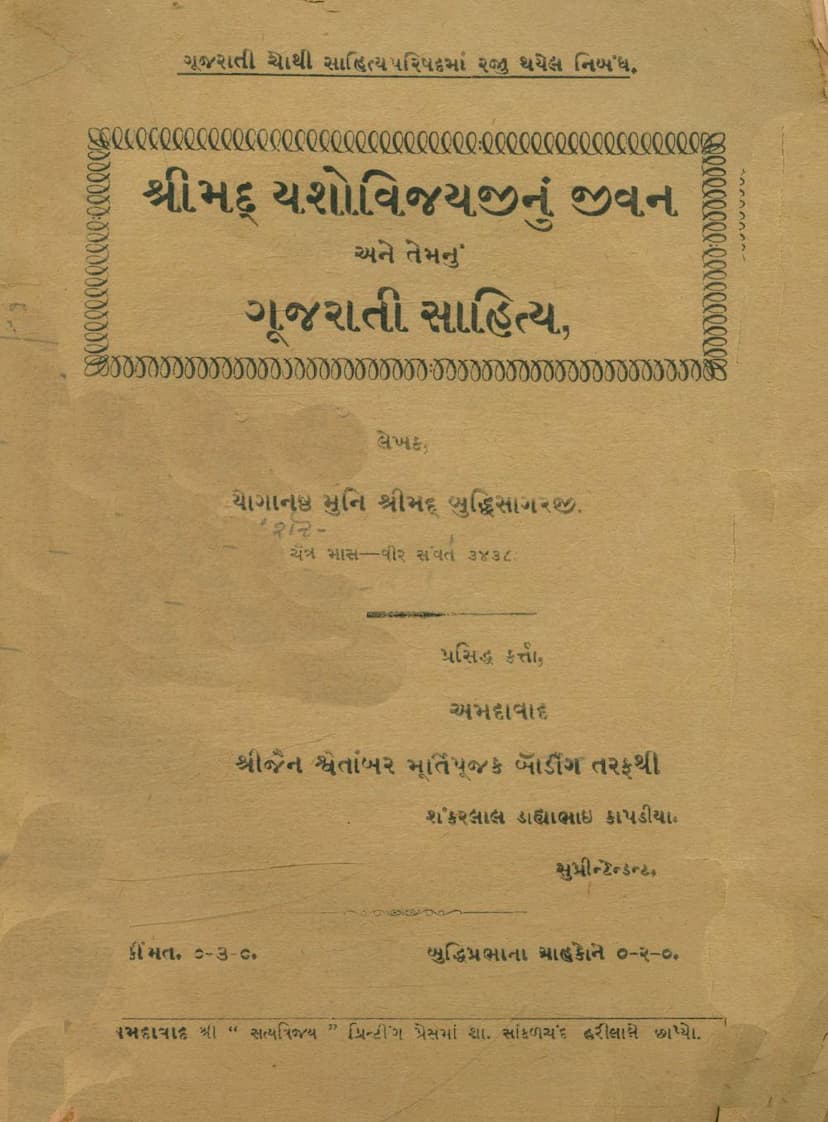Yashovijayjinu Jivan Ane Temnu Gujarati Sahitya
Added to library: September 2, 2025

Summary
Here's a comprehensive summary of the Jain text "Shreemad Yashovijayjinu Jivan Ane Temnu Gujarati Sahitya" by Buddhisagarsuri:
This book, presented as a paper at the Fourth Gujarati Literary Conference, is a detailed biography and literary analysis of the renowned Jain monk and scholar, Shreemad Yashovijayji. The author, Muni Shrimad Buddhisagarji, aims to shed light on the life and literary contributions of this influential figure.
Early Life and Miraculous Signs:
- Yashovijayji, whose childhood name was Jasha, was born in Ahmedabad in the 17th century Vikram Samvat (estimated around 1663 CE).
- Even as a child, Jasha displayed remarkable intelligence and an extraordinary memory.
- A key anecdote highlights his early brilliance: when his mother was unable to attend her daily recitation of the Bhaktamar Stotra due to heavy rain, Jasha, at the age of seven, recited the entire stotra flawlessly from memory, impressing his mother and the monks. This event led the monks to recognize his potential for immense contribution to Jainism.
Asceticism and Education:
- Recognizing his exceptional talent, the monks, led by his Guru Nayavijayji, approached Jasha's mother to request him for initiation into the monastic order.
- His mother, with great spiritual foresight and a desire for the upliftment of Jainism, readily agreed, sacrificing her only son for the greater good of religion.
- Jasha renounced worldly life and received diksha (initiation).
- He pursued advanced studies in grammar and Nyaya (logic) in Kashi, a renowned center of learning, under Brahmin scholars. He excelled in Nyaya, demonstrating his sharp intellect and profound understanding.
- The book mentions his exceptional memory, enabling him to help complete a rare manuscript by memorizing and transcribing it, earning him the title of "NyayaVisharad" (expert in Nyaya) from the Kashi scholars.
- He is also said to have had a divine vision of Goddess Saraswati, who blessed him with mastery of logic and poetry, further enhancing his literary prowess.
Literary Contributions and Scholarship:
- Yashovijayji was a prolific writer, credited with authoring approximately 108 works on Nyaya and a vast corpus of around 200,000 verses across various genres.
- He was a staunch defender of Jain principles, engaging in debates and writing extensively against other philosophical schools, particularly the Digambaras. Works like "Dhikpat Chorasi," "Adhyatma Mat Pariksha," and "Pratima Shatak" are highlighted as examples of his intellectual battles.
- He wrote extensively in both Sanskrit and Gujarati, enriching Gujarati literature with his profound spiritual and philosophical insights.
- His Gujarati works include various Sajjayas (songs of devotion), Stavans (hymns), Rasas (narrative poems), and philosophical treatises, often aiming to simplify complex Jain doctrines for the common people.
- The book details his prolific writing in Gujarati, listing numerous Sajjayas, Stavans, and Rasas. Notable works include:
- Sajjayas: On topics like the eighteen Papasthanas, eight Drishti, Pratikraman, Samkit, Five Great Vows, and various virtues.
- Stavans: Hymns dedicated to various Tirthankaras and Jain deities, often with hundreds of verses.
- Rasas: Narrative poems like the "Shripal Raja no Rasa" and "Jambu Swami no Rasa," which are significant contributions to Jain narrative literature.
- Philosophical Works: "Samadhi Shatak," "Samata Shatak," "Dash Mat no Stavan," and commentaries on various scriptures.
- He also wrote on the importance of ethical conduct, condemning vices like anger, ego, lust, deceit, and hypocrisy through his Sajjayas.
- Yashovijayji's devotional poetry is also highlighted, showcasing his deep love and connection with the divine through his admiration for deities like Ajitanath, Padmaprabh, and Suvidhinath. His "Stavans" reveal a blend of intellectual understanding and profound devotional emotion.
Disputes and Contributions to Jain Dharma:
- The book touches upon the internal disputes within the Jain community during his time, including debates between different Gacchas (sects) and the rise of different philosophical viewpoints.
- Yashovijayji actively participated in these debates, defending the Shwetambar Murtipujak traditions and the established principles of Jainism.
- He is noted for his role in upholding the rituals and practices of the faith, particularly against the criticisms of those who advocated for stricter interpretations or rejected idol worship.
- His patronage of learning and his efforts to spread Jain knowledge are evident in his extensive literary output and his travels.
Later Life and Legacy:
- Yashovijayji's final years were dedicated to spiritual pursuits and the dissemination of Jain philosophy.
- He passed away in Dabhoi, where a memorial exists.
- The book emphasizes his immense contribution to Gujarati literature and Jainism. His works are praised for their clarity, depth, and ability to inspire devotion and spiritual understanding.
- His scholarly acumen was recognized and appreciated by scholars across different traditions. He engaged with and even translated works from other traditions when they aligned with Jain principles, demonstrating a broad and inclusive scholarly approach.
- The author concludes by stating that Yashovijayji's legacy continues to influence Jain thought and literature, and his contributions have been lauded by numerous scholars and saints throughout history.
Overall, the book presents Shreemad Yashovijayji as a multifaceted scholar, a prolific writer, a staunch defender of Jainism, and a profound spiritual exponent whose life and works have left an indelible mark on Gujarati literature and the Jain tradition.